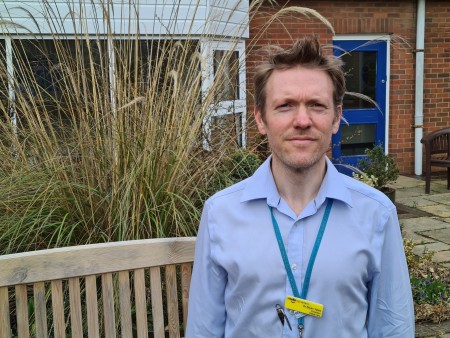Publish date: 25 March 2021
Research team plays crucial role in Covid care

Research has been critical in the fight against Covid-19, with hundreds of patients recruited into life-saving studies by Northumbria Healthcare NHS Foundation Trust in the past year.
In the UK, this has been helped by the unique set-up for delivering research, which meant that when the pandemic struck, Covid-19 became the absolute priority, with researchers across the country shifted onto what are known as urgent public health (UPH) studies, under the auspices of the NIHR (National Institute for Health Research).
The RECOVERY (Randomised Evaluation of Covid-19 Therapy) trial is the UK’s flagship Covid-19 treatment trial, which was launched in the early stages of the global coronavirus outbreak while there were no proven treatments.
A range of treatments have been investigated so far with perhaps the biggest success story being dexamethasone; data shows that it reduces the risk of dying by one-third in ventilated patients and by one-fifth in patients receiving oxygen only.
In addition, the drug is cheap, widely available internationally and already on the World Health Organisation’s list of essential medicines – increasing the global impact of this discovery.
Professor Chris Whitty, Chief Medical Officer for England and co-lead for the NIHR, has described it as ‘the most important trial result for Covid-19 so far’.
A total of 39,033 patients have been recruited to the RECOVERY trial across 180 research sites, with the average number per site being 217.
Northumbria Healthcare, through its hospitals in Northumberland and North Tyneside, has managed almost double that at 431 – as part of 3,401 patients recruited across the North East and North Cumbria – and is in fact among the top 10 recruiting sites in the country.
Bryan Yates (pictured above), a consultant in respiratory medicine and critical care, who is principal investigator for many of the Trust’s Covid-19 studies, said: “RECOVERY is absolutely revolutionary research into a new disease.
“It’s been ground-breaking in terms of how pragmatic and straightforward it has been, and has resulted in many lives being saved.
“Ultimately, it has helped us care for our Covid patients better and meant that we have ensured more seriously ill patients have recovered and returned home to their loved ones.”
Peta Heslop, head of research & development and clinical research nurse manager, added: “The delivery of research has changed during this pandemic, and it is hoped that this results in a long-term shift, in that research opportunities and engagement become more accessible and pragmatic in design.
“It has also raised the profile of research across the trust, we have a huge workforce who are now more familiar and genuinely interested in research as a treatment option.
“Hats off to the Northumbria research team – a team to be proud of, and a team who have worked so hard to achieve this for our patients, who in turn have played their part alongside relatives, doctors and nurses, pharmacists, ward clerks, lab staff, porters and the medical records team, among many others.”
Across a range of other UPH studies between March 2020 and March 2021, the Trust has recruited 1,664 patients, as well as another approximately 900 participants to other trials – such as one that is looking at how Covid affects the clotting of the blood – which have not involved formal recording of numbers with NIHR, but all have helped increase understanding of the disease and therefore supported better outcomes for patients.
In 2019-20, researchers at Northumbria Healthcare recruited 3,050 participants into trials, covering everything from heart disease to cancer, but over the last year that has risen to more than 6,000, despite the fact that almost all non-Covid studies were temporarily paused to allow focus on the UPH trials such as RECOVERY.
The Trust’s research and development director, Dr David Ripley, said: “Research has been fundamental in delivering improvements in Covid care over the last 12 months, and it has become a guidance tool given that it was the only real starting point for treatment at the outset.”
Nationally, a major milestone has recently been reached with NIHR data showing that more than one million participants have taken part in Covid-19 research, across more than 180 studies. Of these, more than 100 were funded by the NIHR, amounting to more than £108million given to dedicated Covid-19 research.
On Monday, March 15, the NIHR and NHS launched the #ResearchVsCovid thank-you campaign to celebrate the efforts of participants, researchers and healthcare professionals for their involvement.
Prof Whitty said: “Reaching one million participants in Covid-19 research shows the impressive selflessness of people across the UK who have volunteered to take part.
“This research has led to vaccines, better treatments and improved care. A huge thank-you to everyone who has taken part in, led or enabled the research.”
